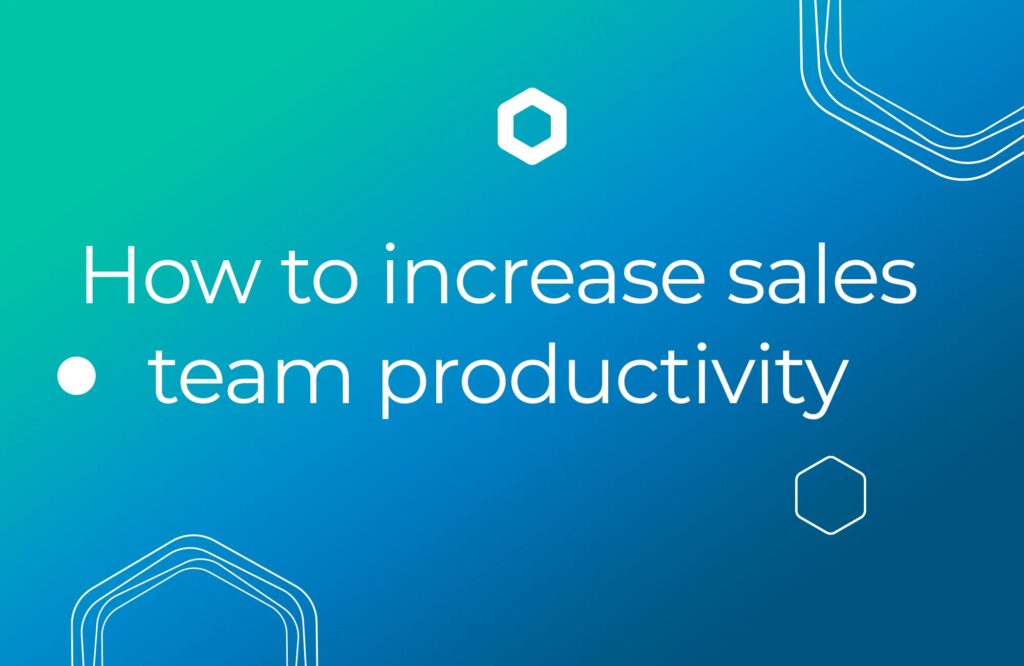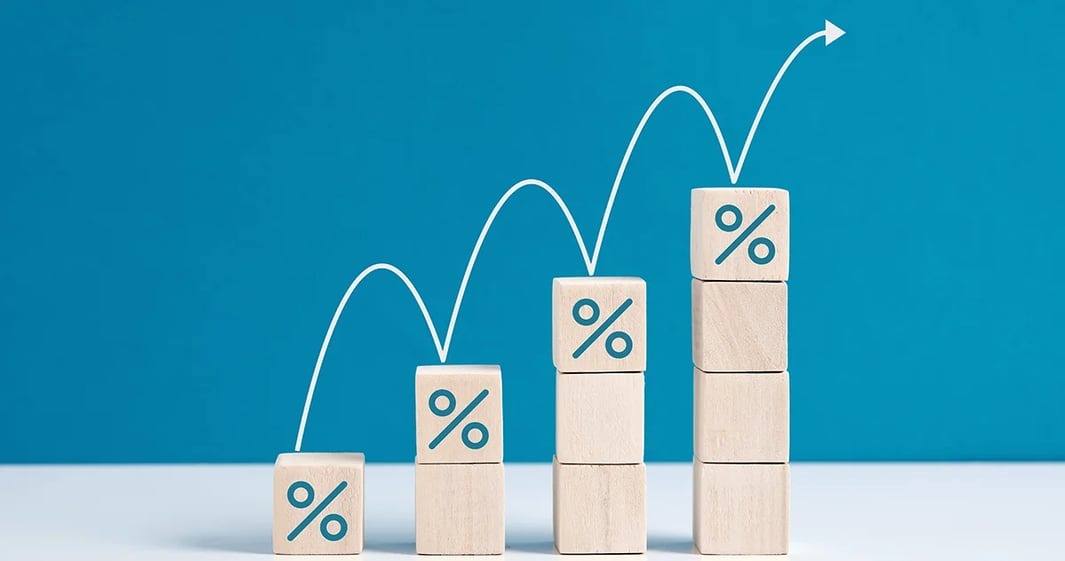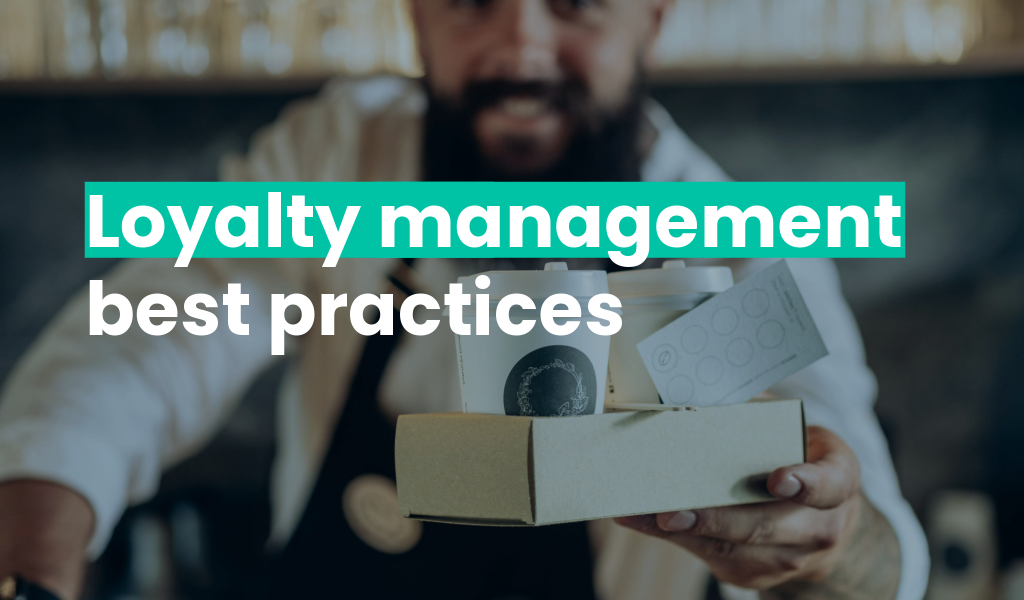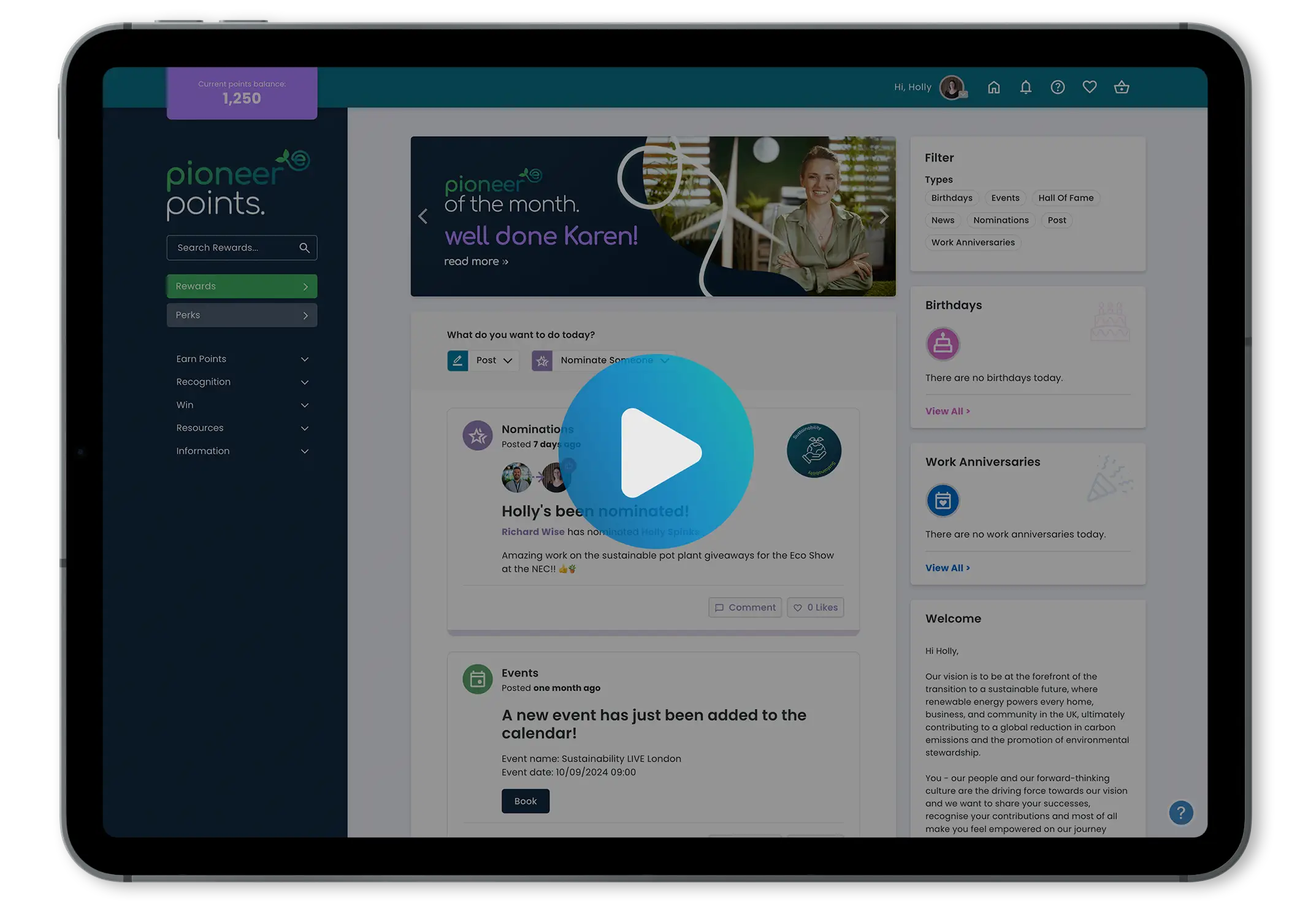


Profitability is the name of the game in sales performance improvement. For sales team leaders it’s all about striking the right balance between top-notch team performance, cost-effectiveness, steady revenue streams and a killer sales strategy.
But let’s face it—navigating this terrain can sometimes feel like trying to find your way in the dark. Without clear insights, spotting areas for improvement in your sales game can be a real challenge.
Here we’ll share 7 practical tips that’ll help improve your sales performance. From leveraging data analytics to refining your sales techniques, we’ll equip you with the tools and strategies you need to inspire your sales team year-round and smash those ever-stretching sales targets!
Skip to:

 Hire the right people
Hire the right people
Building a successful sales team requires more than just finding people with impressive CVs.
It’s about assembling a group of individuals who not only have the required skills, but also share your company’s values and vision. Remember, your sales team is the face of your company, so choose candidates who excel in their roles and embody the essence of your brand.
Here are some of the key factors to look out for when it comes to hiring a sales team:
Emotional Intelligence (EI)
Emotional Intelligence (EI) plays a critical role in sales, where success relies on building relationships, understanding customer needs and navigating complex interactions. Individuals with strong EI excel in these areas, demonstrating empathy towards customers and effectively managing objections or conflicts. Look for candidates who display self-awareness, empathy and strong interpersonal skills when building your sales team.
Proactive attitude
In sales, taking the initiative and showing resilience is crucial. Flourishing sales pros actively seek opportunities, diligently follow up with leads and tackle obstacles head-on. They don’t sit back and wait; instead, they actively pursue success. When evaluating candidates during the hiring process, examine their track record for instances of taking initiative, problem-solving and demonstrating perseverance.
Collaborative mindset
Although sales environments may foster competition between individuals, teamwork is indispensable for achieving collective success. Sales teams frequently collaborate on intricate deals and exchange best practices. Seek candidates who prioritise teamwork and are eager to share expertise and resources to achieve collaborative success.
Coachability
Coachability is a critical factor in sales success, as it entails the ability to learn and adapt. As strategies, markets and technologies are in constant flux, candidates who exhibit a growth mindset are invaluable. Look for individuals who are receptive to feedback, eager to expand their knowledge and open to taking part in training courses.
Alignment with company culture
Sales pros who resonate with your company’s values, mission and culture are more likely to be driven and dedicated to achieving results. A cultural fit enhances team cohesion and promotes long-term retention, ensuring that your entire team remains cohesive and committed to the organisation’s objectives.

 Set clear goals and objectives
Set clear goals and objectives
The secret to improving sales performance hinges on setting clear goals and objectives.
These goals act as a roadmap, guiding each team member toward a shared vision. However, this requires careful planning and alignment with the organisation’s overall strategy. It’s crucial to set goals that are specific, measurable and in line with the company’s direction, which creates a healthy balance between ambition and achievability.
Effective communication is vital in this process. Every sales team member should understand their role and how their performance will be measured. Transparently sharing the metrics used to assess success and establishing a timeline for achieving goals helps individuals align their efforts with broader objectives.
After setting clear goals, it’s important to break them down into smaller, actionable steps.
This strategy transforms lofty objectives into manageable tasks that salespeople can tackle systematically. In turn, this helps individuals visually see their progress, which gives them a sense of accomplishment and motivation to move on to the next challenge.
Sales leaders should provide regular progress reviews which serve as checkpoints to assess the team’s performance and identify any obstacles. What’s more, it also offers an opportunity to celebrate individual and team successes and offer rewards when deserved (which we will move onto a bit later on).
Ready to smash your sales targets? Check out the video below for an in-depth, step-by-step guide on setting sales goals:
 Optimise your sales process
Optimise your sales process
Enhancing your sales process is all about fine-tuning each step, from prospecting to sealing the deal. It’s about creating smoother workflows, improving efficiency and ultimately delivering stronger results.
Here are some key ways to make that happen:
Analyse and change-up your current sales pipeline
Let’s face it: the old “set it and forget it” approach to sales just doesn’t cut it anymore. If you’re still dusting off last year’s plan come December, it’s high time for a rethink.
Being nimble is key, as consumer needs and market dynamics are constantly evolving.
That means your sales playbook should be too. Instead of waiting for the year-end scramble, why not schedule regular strategy sessions? Whether it’s every six months, quarterly or even monthly, these check-ins help ensure your approach stays fresh and relevant.
During this stage, it’s essential to conduct a thorough examination to uncover bottlenecks, inefficiencies and areas ripe for improvement. By harnessing the power of data analytics, businesses can gain valuable insights into customer behavior, trends and sales performance metrics.
Research from McKinsey reinforces this, revealing that companies adept at leveraging data analytics are 23 times more likely to acquire customers, six times as likely to retain them, and 19 times as likely to be profitable.
Implement automation tools and technology
By taking over repetitive tasks and cutting down on manual errors, your sales team will get to spend more time on the important stuff – building relationships and closing deals. It’s a game-changer, freeing up their energy for tasks that really move the needle.
In fact, Salesforce’s research found that…
Businesses adopting automation saw a whopping 34% increase in sales productivity.
Collaboration between teams
According to Harvard Business Review,
Companies that foster strong collaboration between sales and marketing teams achieve an impressive 20% annual revenue growth.
This statistic highlights the tangible benefits of breaking down departmental silos and promoting a culture of cross-functional collaboration.

 Incentivise your sales team
Incentivise your sales team
Offering incentives to salespeople can be a game-changer, especially when a business is experiencing a downturn. These incentives not only spur performance but also inject a much-needed boost of morale when sales are slow.
By tying incentives to specific objectives, companies can offer a powerful motivation for their sales teams to go above and beyond expectations. Whether it’s through monetary rewards, recognition or career advancement opportunities, these incentives provide tangible rewards for hard work and dedication, instilling a sense of purpose and excitement within the sales force.
So, do sales incentives actually work?
Well, let’s look at the numbers…
Harvard Business Review went on to discover that sales leaders that offered incentives outsell those without, by a significant margin— with up to 20% higher revenue.
However, it’s all about choosing the right incentive plan for your team.
Here are some of the best incentives for salespeople to improve sales performance:
Financial rewards
Financial rewards play a pivotal role in motivating sales teams, offering tangible incentives that directly correlate sales performance with monetary gain. Commissions, bonuses and profit-sharing schemes serve as powerful motivators, driving individuals to push their limits and surpass predetermined sales targets.
Recognition and awards
Public acknowledgment, awards ceremonies and accolades serve as powerful tools for uplifting morale and fostering camaraderie within the team. When salespeople are recognised for their hard work and achievements, it validates their efforts, reinforcing their commitment to excellence.
Moreover, such recognition doesn’t just benefit the individual recipient; it also inspires others to strive for similar levels of success, creating a positive feedback loop of motivation and performance improvement.

Career advancement opportunities
Whether it’s the chance to climb the corporate ladder through promotions, take on leadership roles where they can mentor others or participate in specialised training to sharpen their skills, these pathways provide a clear trajectory for growth and development.
Salespeople are naturally driven individuals and knowing that their efforts can lead to greater responsibilities and recognition fuels their motivation to continuously improve. Also, the prospect of career growth within the organisation instills a sense of loyalty and investment in the company’s success, as salespeople tend to see themselves as integral parts of a larger journey toward shared goals.
Contests and challenges
Contests and challenges are like injecting a shot of adrenaline into the sales environment, sparking excitement and igniting a friendly spirit of competition. When teams come together to participate, it’s not just about winning; it’s about building bonds and fostering a sense of unity.
The thrill of competing against one another drives collaboration and teamwork, as colleagues join forces to conquer shared goals. In turn, these events have the ability to create a sense of urgency to achieve, motivating everyone to channel their efforts towards hitting specific sales targets.
Looking for innovative ways to motivate your sales team? Check out these 30 fun sales incentive ideas to spark competition and drive results!
Perks and benefits
Offering additional perks of being part of the company’s sales team goes beyond just providing a job with ready access to strong coffee! Great perks help foster an environment where hungry salespeople feel valued and supported.
- Travel incentives, for example, not only reward hard work but also offer opportunities for relaxation and exploration, allowing high-flyers to recharge and return to work with renewed energy.
- Company-sponsored events bring teams together outside of the office, fostering stronger bonds between colleagues. From team-building retreats to celebratory dinners, these events create lasting memories and deepen connections.
- Flexible work arrangements, such as remote work options or flexible hours, will empower your sales team to strike a better balance between their work and personal lives, resulting in greater job satisfaction and increased effort when they are hitting the phones.
Collectively, these perks contribute to a positive work culture that prioritises well-being and happiness, ultimately leading to higher retention rates and a more engaged sales team striving for success.

 Prioritise customer satisfaction
Prioritise customer satisfaction
Winning the next big sale by any means necessary simply isn’t a sustainable way to run a sales team. And it’s certainly not a recipe to improve sales performance in the long-term.
Success truly hinges on how well you treat your customers throughout their journey. They’re not just buyers; they’re the lifeblood of your business. Recent findings from Bain and Company shed light on the incredible impact of keeping customers happy. They found that:
Even a small 5% boost in customer retention can lead to a whopping 25% increase in profits.
That’s because it’s way cheaper to keep existing customers happy than to constantly chase after new ones.
Think about it: in a world where everyone’s bombarded with ads and sales pitches, what makes customers stick around? It’s the experience they have with your brand.
According to research by American Express, a third of customers would ditch a brand after just one bad encounter with customer service.
That’s why it’s crucial to treat every interaction as an opportunity to build trust and loyalty.
So, how do you do it?
Start by truly understanding your customers – their needs, preferences and pain points. Then use data and insights to personalise your approach an show them that you’re there to solve their problems, not just sell them stuff.
By focusing on building genuine relationships and delivering exceptional service, you’ll not only keep customers coming back but also turn them into raving fans who’ll gladly spread the word about your business. Which makes landing a steady stream of high-value accounts a breeze!

 Familiarise yourself with KPIs
Familiarise yourself with KPIs
To improve sales performance, you must fully understand and closely monitor essential sales metrics and Key Performance Indicators (KPIs) for individuals and the wider team.
These metrics serve as critical benchmarks for evaluating sales effectiveness and provide valuable insights into individual performance. With this in mind, sales pros can gain a deeper understanding of their performance and make informed decisions to enhance their sales efforts.
Key Performance Indicators (KPIs) are vital for assessing the health and effectiveness of sales strategies.
Here are the top 9 KPI measurements to increase sales performance:
- Revenue: (Total Sales: Overall revenue from sales & Net Sales: Total revenue minus returns, discounts, and allowances)
- Sales Growth: Month-over-month or Year-over-Year growth.
- Conversion Rate: Percentage of leads converting into sales.
- Customer Acquisition Cost (CAC): Cost to acquire a new customer.
- Customer Lifetime Value (CLV or LTV): Total revenue expected from a customer.
- Sales Pipeline Metrics: (Number of Deals: Total potential sales opportunities & Pipeline
- Value: Total potential value of all deals)
- Win Rate: Percentage of successful deals.
- Lead-to-Customer Conversion Rate: Percentage of leads becoming customers.
- Sales Cycle Length: Average time to close a deal.
- Churn Rate: Percentage of lost customers.
- Profit Margin: Percentage of revenue that’s profit.
- Upsell and Cross-sell Metrics: Percentage of customers making additional purchases.
Ready to smash your sales targets? Check out the video below for an in-depth, step-by-step guide on setting sales goals:
 Experiment with peer-to-peer coaching
Experiment with peer-to-peer coaching
When you assemble a team with diverse levels of expertise and experience, you’re essentially creating a knowledge-sharing powerhouse.
Each team member brings unique insights and skills to the table, providing valuable opportunities for learning and growth. This collaborative environment fosters a sense of collective responsibility towards achieving common objectives, driving everyone to uphold high standards and continuously strive for improvement.
Peer-to-peer coaching serves as a cornerstone of a culture of learning and development.
Seasoned team members act as mentors, sharing their wealth of knowledge and proven best practices with their less experienced counterparts. This mentorship not only helps newer team members overcome obstacles and refine their skills, but also accelerates their professional development.
On the other hand, junior team members inject fresh perspectives and innovative ideas into the mix, challenging conventional thinking and driving forward-thinking approaches.
This collaborative spirit not only strengthens individual competencies but also enhances team dynamics, boosts morale and ultimately leads to improved sales performance and business success.
Supercharge your sales team performance
With Incentivesmart by your side, you can take your sales performance to new heights!
We offer eye-popping incentives designed to inspire and motivate sales teams, fostering a sense of camaraderie and excellence whilst dramatically increasing sales performance.
If you’re eager to see your sales soar and unleash the full potential of your sales superheroes, it’s time to join forces with us. Together, let’s transform your sales strategy and pave the way for unparalleled success!



![How to inspire your sales team (and smash target!) {{ include_custom_fonts({"Poppins":["Semi Bold"]}) }}](https://no-cache.hubspot.com/cta/default/5921162/interactive-187541229676.png)





